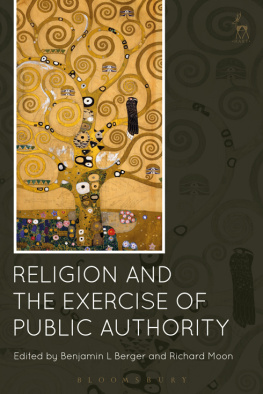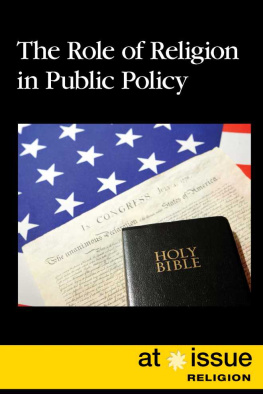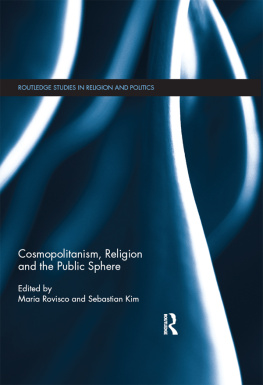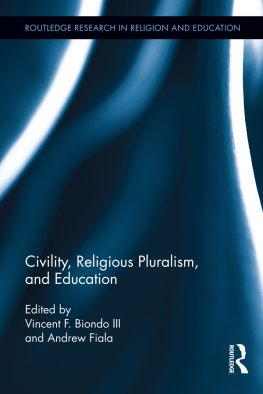Table of Contents

RELIGION AND THE EXERCISE OF PUBLIC AUTHORITY
In the burgeoning literature on law and religion, scholarly attention has tended to focus on broad questions concerning the scope of religious freedom, the nature of toleration and the meaning of secularism. An under-examined issue is how religion figures in the decisions, actions and experiences of those charged with performing public duties. This point of contact between religion and public authority has generated a range of legal and political controversies around issues such as the wearing of religious symbols by public officials, prayer at municipal government meetings, religious education and conscientious objection by public servants.
Authored by scholars from a variety of disciplines, the chapters in this volume provide insight into these and other issues. Yet the volume also provides an entry point into a deeper examination of the concepts that are often used to organise and manage religious diversity, notably state neutrality. By examining the exercise of public authority by individuals who are religiously committedor who, in the discharge of their public responsibilities, must account for those who arethis volume exposes the assumptions about legal and political life that underlie the concept of state neutrality and reveals its limits as a governing ideal.
Religion and the Exercise
of Public Authority
Edited by
Benjamin L Berger
and
Richard Moon

OXFORD AND PORTLAND, OREGON
2016
ACKNOWLEDGEMENTS
We wish to express our thanks to the authors who contributed their knowledge, insight, and creativity to this collection and to the people at Hart Publishing for their support and expert work in bringing this volume to print. Thank you also to Rachel Devon for her superb research assistance along the way.
This collection arose out of a workshop held at Osgoode Hall Law School, York University, in the autumn of 2014. A special thank-you to Jody-Ann Rowe for her outstanding work organizing that event. We are grateful to the Social Sciences Research Council, the Religion and Diversity Project housed at the University of Ottawa, the Faculty of Law at the University of Windsor, and Osgoode Hall Law School for supporting the workshop and the collaborations that led to this volume.
Amlie Barras is Assistant Professor at the Department of Social Science, York University.
Lori G Beaman is Canada Research Chair at the Department of Classics and Religious Studies, University of Ottawa.
Benjamin L Berger is Associate Professor at Osgoode Hall Law School, York University.
Faisal Bhabha is Associate Professor at Osgoode Hall Law School, York University.
Paul Bramadat is Director of the Centre for Studies in Religion and Society, University of Victoria.
Pamela E Klassen is Professor at the Department for the Study of Religion, University of Toronto.
Solange Lefebvre is Professor and Chair for the Management of Cultural and Religious Diversity at the Faculty of Theology and Religious Sciences, University of Montreal.
Jocelyn Maclure is Professor at the Faculty of Philosophy, University of Laval.
Richard Moon is Professor at the Faculty of Law, University of Windsor.
Bruce Ryder is Associate Professor at Osgoode Hall Law School, York University.
Jennifer A Selby is Associate Professor at the Department of Religious Studies, Memorial University.
Shauna Van Praagh is Professor at the Faculty of Law, McGill University.
Daniel M Weinstock is James McGill Professor at the Faculty of Law, McGill University, and Director of the McGill Institute for Health and Social Policy.
RICHARD MOON AND BENJAMIN L BERGER
Over the last many years a host of legal and political controversies have arisen out of the meeting of religion and the exercise of public authority. Some of the most contentious disputes have concerned the performance of public duties by religiously committed individuals. Other cases have involved public authorities struggling to account for a religiously diverse society. These issues have exposed the difficulties engendered when civic officials engage with religionboth as a fact of social life and as an aspect of their own identitieswhile discharging their public responsibilities.
Most familiar are the controversies that have arisen in jurisdictions around the world concerning the wearing of religious symbols by public officials. The issue has often surfaced as a question about whether teachers should be permitted to wear identifiably religious clothing. or the provision of healthcare and reproductive health services by medical professionals. The point of contact between public authority and religious commitment is a site that will continue to generate a range of legal and political controversies. The authors who have contributed to this volume provide insight into many of these issues. That is one way in which this volume is both timely and important: it offers to scholars of law, politics and religion a helpful resource in exploring these discrete but important debates.
Yet perhaps more importantly, the volume also provides an entry point into a deeper examination of the concepts we use to organise and manage religious diversityconcepts such as tolerance, secularism and neutrality. The volumes focus on religion and the exercise of public authority brings to the surface the many difficulties involved in separating religious belief and practice from political action, exposing the complexity of these outwardly orderly concepts. Drawing on the insights and perspectives of anthropologists, religious studies scholars, philosophers, sociologists and legal scholars, this volumes interdisciplinary examination of the issues generated by the meeting of religion and public authority challenges our familiar ways of framing questions, encourages us to notice dimensions of these issues that might otherwise fall outside our range of vision, and pushes us to think more carefully and critically about the abstract principles that guide legal and political discussion of contemporary religious diversity.
The broad concepts that we seize upon as guides for managing religious difference express valuable ideals and provide a language for legal debate, but they also tend to paper over many of the complexities and challenges of religious difference. Two such conceptstoleration and secularismare illustrative. Toleration has, of course, a long pedigree as a philosophical ideal and legal tool in matters of religious freedom, equality and diversity. It was, for many years, the dominant concept invoked by the Supreme Court of Canada in its freedom of religion jurisprudence and anchored political discussion about how to address religious difference. And yet as cases and controversies continued to accumulate, scholarship has shown that the social experience of legal toleration is often one of exclusion and marginalisation.
This volume is appearing just as another concept has become prominent in legal discussions of how to manage religion: the concept of state neutrality. It emerges in the jurisprudence of international courts as the foundational demand flowing from a commitment to religious freedom;
Although the Supreme Court of Canada has conceded that the states duty of neutrality does not require it to abstain from celebrating and preserving its religious heritage, Accordingly, the state is precluded from preferring or supporting the practices or beliefs of one religion over those of another, or favouring religious belief over non-religious belief, and vice versa.






![Blackford - Freedom of religion [and] the secular state](/uploads/posts/book/167779/thumbs/blackford-freedom-of-religion-and-the-secular.jpg)


